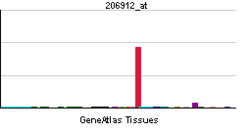FOXE1
| View/Edit Human | View/Edit Mouse |
Forkhead box protein E1 is a protein that in humans is encoded by the FOXE1 gene.[3][4][5]
Location
The FOXE1 gene is located on the long (q) arm of chromosome 9 at position 22 FOXE1
Function
This intronless gene belongs to the forkhead family of transcription factors, which is characterized by a distinct forkhead domain. This gene functions as a thyroid transcription factor which likely plays a crucial role in thyroid morphogenesis.
Clinical significance
Mutations in this gene cause Bamforth-Lazarus syndrome[6] and are associated with congenital hypothyroidism and cleft palate with thyroid dysgenesis. The map localization of this gene suggests it may also be a candidate gene for squamous cell epithelioma and hereditary sensory neuropathy type I.[5]
The region surrounding the FOXE1 gene has shown association in the pathogenesis of cleft lip and palate with genome-wide levels of significance in linkage analysis studies with additional fine-mapping and replication.[6]
Tissue localization
FOXE1 is expressed transiently in the developing thyroid and the anterior pituitary gland.[7]
Avian FOXE1 is also expressed in developing feathers.[8]
See also
References
- ↑ "Human PubMed Reference:".
- ↑ "Mouse PubMed Reference:".
- ↑ Chadwick BP, Obermayr F, Frischauf AM (Jul 1997). "FKHL15, a new human member of the forkhead gene family located on chromosome 9q22". Genomics. 41 (3): 390–6. doi:10.1006/geno.1997.4692. PMID 9169137.
- ↑ Clifton-Bligh RJ, Wentworth JM, Heinz P, Crisp MS, John R, Lazarus JH, Ludgate M, Chatterjee VK (Sep 1998). "Mutation of the gene encoding human TTF-2 associated with thyroid agenesis, cleft palate and choanal atresia". Nat Genet. 19 (4): 399–401. doi:10.1038/1294. PMID 9697705.
- 1 2 "Entrez Gene: FOXE1 forkhead box E1 (thyroid transcription factor 2)".
- 1 2 Dixon MJ, Marazita ML, Beaty TH, Murray JC (March 2011). "Cleft lip and palate: understanding genetic and environmental influences". Nat. Rev. Genet. 12 (3): 167–78. doi:10.1038/nrg2933. PMC 3086810
 . PMID 21331089.
. PMID 21331089. - ↑ Zannini M, Avantaggiato V, Biffali E, et al. (June 1997). "TTF-2, a new forkhead protein, shows a temporal expression in the developing thyroid which is consistent with a role in controlling the onset of differentiation". EMBO J. 16 (11): 3185–97. doi:10.1093/emboj/16.11.3185. PMC 1169936
 . PMID 9214635.
. PMID 9214635. - ↑ Yaklichkin SY, Darnell DK, Pier MV, et al. (Oct 2011). "Accelerated evolution of 3'avian FOXE1 genes, and thyroid and feather specific expression of chicken FoxE1.". BMC Evol Biol. 11 (302): 3185–97. doi:10.1186/1471-2148-11-302. PMC 3207924
 . PMID 21999483.
. PMID 21999483.
Further reading
- Wiese S, Emmerich D, Schröder B, et al. (1997). "The novel human HNF-3/fork head-like 5 gene: chromosomal localization and expression pattern.". DNA Cell Biol. 16 (2): 165–71. doi:10.1089/dna.1997.16.165. PMID 9052737.
- Zannini M, Avantaggiato V, Biffali E, et al. (1997). "TTF-2, a new forkhead protein, shows a temporal expression in the developing thyroid which is consistent with a role in controlling the onset of differentiation.". EMBO J. 16 (11): 3185–97. doi:10.1093/emboj/16.11.3185. PMC 1169936
 . PMID 9214635.
. PMID 9214635. - Macchia PE, Mattei MG, Lapi P, et al. (1999). "Cloning, chromosomal localization and identification of polymorphisms in the human thyroid transcription factor 2 gene (TITF2).". Biochimie. 81 (5): 433–40. doi:10.1016/S0300-9084(99)80092-3. PMID 10403172.
- Wang JC, Waltner-Law M, Yamada K, et al. (2000). "Transducin-like enhancer of split proteins, the human homologs of Drosophila groucho, interact with hepatic nuclear factor 3beta.". J. Biol. Chem. 275 (24): 18418–23. doi:10.1074/jbc.M910211199. PMID 10748198.
- Sequeira MJ, Morgan JM, Fuhrer D, et al. (2002). "Thyroid transcription factor-2 gene expression in benign and malignant thyroid lesions.". Thyroid. 11 (11): 995–1001. doi:10.1089/105072501753271662. PMID 11762722.
- Castanet M, Park SM, Smith A, et al. (2003). "A novel loss-of-function mutation in TTF-2 is associated with congenital hypothyroidism, thyroid agenesis and cleft palate.". Hum. Mol. Genet. 11 (17): 2051–9. doi:10.1093/hmg/11.17.2051. PMID 12165566.
- Sequeira M, Al-Khafaji F, Park S, et al. (2004). "Production and application of polyclonal antibody to human thyroid transcription factor 2 reveals thyroid transcription factor 2 protein expression in adult thyroid and hair follicles and prepubertal testis.". Thyroid. 13 (10): 927–32. doi:10.1089/105072503322511328. PMID 14611701.
- Romanelli MG, Tato' L, Lorenzi P, Morandi C (2004). "Nuclear localization domains in human thyroid transcription factor 2.". Biochim. Biophys. Acta. 1643 (1-3): 55–64. doi:10.1016/j.bbamcr.2003.09.002. PMID 14654228.
- Eichberger T, Regl G, Ikram MS, et al. (2004). "FOXE1, a new transcriptional target of GLI2 is expressed in human epidermis and basal cell carcinoma.". J. Invest. Dermatol. 122 (5): 1180–7. doi:10.1111/j.0022-202X.2004.22505.x. PMID 15140221.
- Tonacchera M, Banco M, Lapi P, et al. (2005). "Genetic analysis of TTF-2 gene in children with congenital hypothyroidism and cleft palate, congenital hypothyroidism, or isolated cleft palate.". Thyroid. 14 (8): 584–8. doi:10.1089/1050725041692864. PMID 15320969.
- Brancaccio A, Minichiello A, Grachtchouk M, et al. (2005). "Requirement of the forkhead gene Foxe1, a target of sonic hedgehog signaling, in hair follicle morphogenesis.". Hum. Mol. Genet. 13 (21): 2595–606. doi:10.1093/hmg/ddh292. PMID 15367491.
- Watkins WJ, Harris SE, Craven MJ, et al. (2006). "An investigation into FOXE1 polyalanine tract length in premature ovarian failure.". Mol. Hum. Reprod. 12 (3): 145–9. doi:10.1093/molehr/gal017. PMID 16481406.
- Baris I, Arisoy AE, Smith A, et al. (2006). "A novel missense mutation in human TTF-2 (FKHL15) gene associated with congenital hypothyroidism but not athyreosis.". J. Clin. Endocrinol. Metab. 91 (10): 4183–7. doi:10.1210/jc.2006-0405. PMID 16882747.
External links
- FOXE1 protein, human at the US National Library of Medicine Medical Subject Headings (MeSH)
- FOXE1 human gene location in the UCSC Genome Browser.
- FOXE1 human gene details in the UCSC Genome Browser.
This article incorporates text from the United States National Library of Medicine, which is in the public domain.
